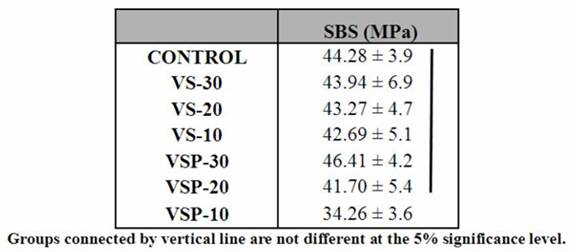ABSTRACT: 3127
Hemostatic Agent Rinse Time Effect on Composite to Dentin Bonds
| S.J. MCNALLY, N.S. KIMMES, and W.W. BARKMEIER, Creighton University, Omaha, NE, USA | |
Dentin contamination has been shown to have an adverse effect on the bond strength of resin composite restorations. Objective: The purpose of this study was to examine the effect of rinse time for hemostatic agents, ViscoStat(VS) and ViscoStat Plus(VSP), on the shear bond strength(SBS) of composite resin(CR) to dentin. Methods: Seventy non-carious, permanent teeth mounted in acrylic were randomly divided into seven groups(n=10): 1) Control(C), 2) ViscoStat (Ultradent), 30s rinse(VS-30), 3) ViscoStat, 20s rinse(VS-20), 4) ViscoStat, 10s rinse(VS-10), 5) ViscoStat Plus(Ultradent), 30s rinse(VSP-30), 6) ViscoStat Plus, 20s rinse(VSP-20), 7)ViscoStat Plus, 10s rinse(VSP-10). Dentin specimens were finished to a 600-grit surface. Groups 2, 3 and 4 were exposed to VS(30s) and Groups 5, 6, and 7 were exposed to VSP(30s) and rinsed with distilled water. Groups 2 and 5 were rinsed for 30s, Groups 3 and 6 were rinsed for 20s, and Groups 4 and 7 were rinsed for 10s. All groups were air dried, etched with 35% phosphoric acid(Ultra-Etch, Ultradent) and bonded utilizing the Ultradent bonding assembly, Optibond Solo Plus(Kerr) and Z-250(3M ESPE) CR following manufacturers' directions. CR was light cured for 40s with a Spectrum 800(Dentsply International) curing unit(600mW/cm2). Following 24-hours water storage(37oC), specimens were debonded in a test frame at a crosshead speed of 1mm/min. Statistical analysis was done with ANOVA and Tukey's post hoc test(SPSS v.15.0). Results:
Conclusion: Under the conditions of this controlled lab study it was concluded that the shear bond strength of resin composite to dentin was not decreased if ViscoStat was rinsed for 10 seconds or more and if ViscoStat Plus was rinsed for 20 seconds or more. | |
| Seq #291 - Surface Treatment 1:45 PM-3:00 PM, Saturday, July 5, 2008 Metro Toronto Convention Centre Exhibit Hall D-E | |
|
Back to the Dental Materials 1: Adhesion - Bond Strength Testing and Mechanisms Program | |
©Copyright 2008 American Association for Dental Research. All Rights Reserved.
